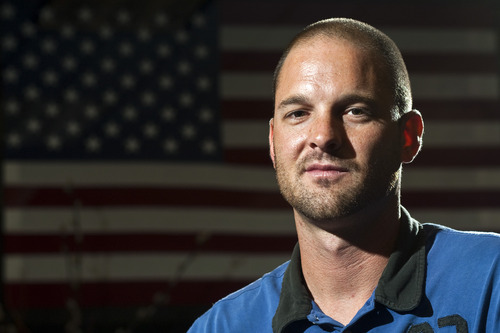This is an archived article that was published on sltrib.com in 2011, and information in the article may be outdated. It is provided only for personal research purposes and may not be reprinted.
Hill Air Force Base • To build a coffin for a child, all that's needed is a sheet of plywood, a good power saw, some screws and nails for the lid.
Air Force Reservist Jason Reininger of Tooele learned that during his six-month stint in the desert of Afghanistan, a war zone where casualties come in all ages.
Reininger, a medical technician in the 419th Medical Squadron at Hill Air Force Base, recently returned from Camp Bastion, a British base in Helmand province, Afghanistan.
On slow days when there were few American service members in need of treatment or transport, Reininger put his carpentry skills to work. Using scrap wood from throughout the base, he built everything form a podium to a shade tent large enough for vehicles, and, toward the end of his deployment, coffins.
He took on the latter task at the request of the commander of the British hospital at Camp Bastion, where injured service members as well as Afghan military and civilians are initially treated and often die.
The 23-member squadron he was deployed with, the 451st Expeditionary Aeromedical Evacuation Squadron, worked near the hospital, treating and preparing American service members for transport to U.S. military hospitals or the United States.
The hospital's contract for coffins had lapsed, and there was a need for child-size coffins, Reininger said during an interview at Hill Air Force Base, shortly after he returned.
"Their alternative if they didn't have the coffins was just a body bag," said Reininger, a father of two.
The commander of the 451st staging facility, Barbara Persons, didn't hesitate to volunteer Reininger and other airmen for the volunteer work.
"I knew my airmen would feel the same way as I did — anything to preserve the dignity of an innocent child," Persons told the American Forces Press Service.
"I thought, these are kids, regardless of nationality … kids that were in the wrong place, that had nothing to do with the war," Reininger said. "I would much rather have my kids delivered to me in a box or a coffin, rather than a bag."
He asked the British to advise him of any cultural traditions he should know about and began researching the Internet on how to build a coffin.
Reininger had to improvise a bit — coffin-building websites generally suggest fine woods — but he found one with plans for turning a single sheet of 4-by-8 foot plywood into a coffin, wide at the shoulders and tapered at the feet.
The airman built a prototype and two more coffins before leaving in July, and will never know the families whose children are buried in them.
Nonetheless, he hopes that his small show of respect for a child's life will foster more trust among Afghan civilians for the coalition's medical workers.
"Maybe they will be more willing to accept medical treatment," he said.



